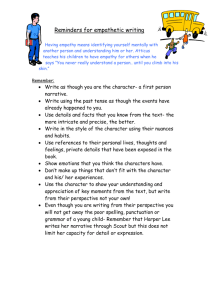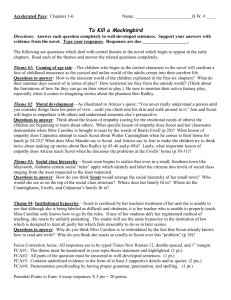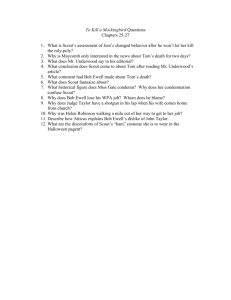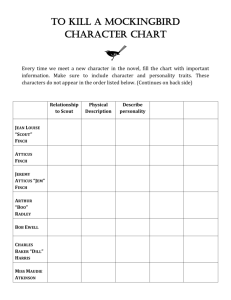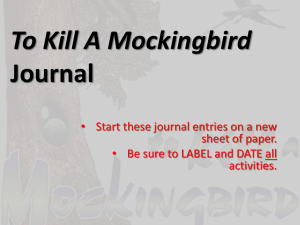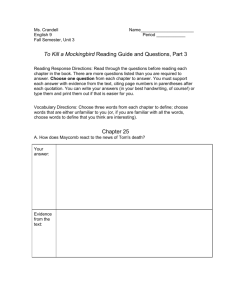Works Cited How To - Ms. Davidson's Classes
advertisement
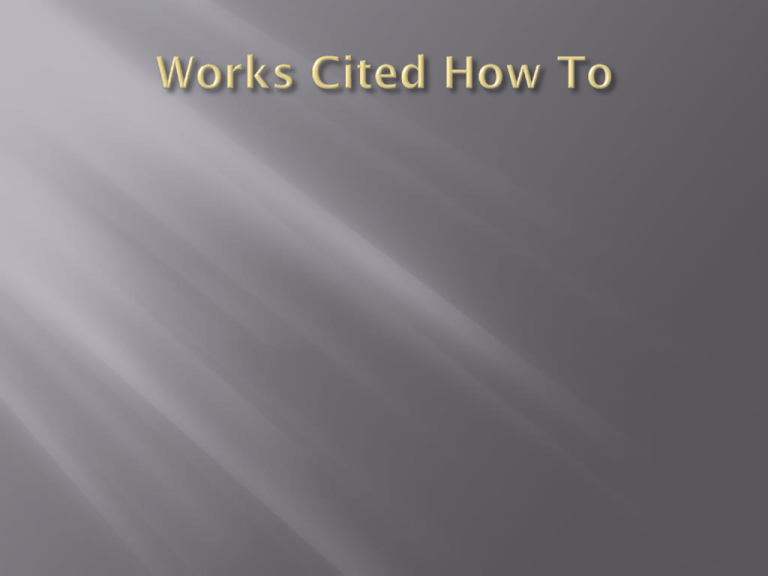
I’m referencing a poem called Alone by Maya Angelou. On the Works Cited List I will have a citation that looks like this: Angelou, Maya. “Alone.” Echoes 12. Eds. John Kinglsey et al. Toronto: Penguin Press, 2001. Print. However, in the essay I am just putting a symbol/abbreviation to help the reader find that information on the big Works Cited list. So all I need is the abbreviation- the author’s last name and the line or page number: She states “I am lost” (Angelou 2). If you are doing a film, there is no author. Eternal Sunshine of the Spotless Mind. Dir. Michel Gondry. Perf. Jim Carrey, Kate Winslet, Elijah Wood, Thomas Jay Ryan, Mark Ruffalo, Kirsten Dundst, Tom Wilkinson. Focus Features, 2004. DVD. If you are doing a website sometimes there is an author and sometimes there isn’t. “Literary Career.” The Victorian Web. 10 November 2010. 13 February 2014. Web.<http://www.scholars.nus.edu.sg/landow/victorian/authors/c rossetti/rossetti5.html >. So in these cases you use the title or an abbreviation of the title in your citation: (Eternal). (Literary Career). Note that these examples don’t have page numbers either so you leave those blank. This terrible tragedy causes Jack’s entire world to come crashing down around him in a cacophony of suffering and pain. His perceptions about himself are greatly altered, as he inflicts great mental punishment upon himself for this accident. We are told, “He was incapable of love, he told himself, striking the steering wheel. He was inherently bad, a spiritual defective. He was evil” (Gardner 1). This self- punishment and harsh judgment of oneself can seriously damage a person permanently. Jack knows he needs something to pull him out of his figurative hell, to save him from the torment that is killing his spirit. Three Lines or Less This demonstrates that Hamlet has a great capacity for love and emotion. His distraught behavior shows that he is susceptible to human emotion and isn’t cold hearted. Hamlet, overwhelmed by his emotions wishes to escape the pain and heal his emotional wounds with the help of time. However, his need is ignored when King Claudius states “Do I impart toward you, For your intent/In going back to school in Wittenberg/Is most retrograde to our desire” (Shakespeare I.ii.112-114). Claudius sees Hamlet’s mourning as dangerous and wants to watch him. He also criticizes him and tells him to respond like a ‘man’ should. As a result, Hamlet is unable to repair his spirits and instead grows more miserable. His emotion is seen as weakness s and unmanly and therefore he is a product of gender restriction. Hamlet becomes increasingly unhealthy and his resulting actions change him from being moral and sympathetic to being dramatically altered by mores and the people who surround him. Three Lines or More This demonstrates that Hamlet has a great capacity for love and emotion. His distraught behavior shows that he is susceptible to human emotion and isn’t cold hearted. Hamlet, overwhelmed by his emotions wishes to escape the pain and heal his emotional wounds with the help of time. However, his need is Ignored when King Claudius states My Will Do I impart toward you, For your intent In going back to school in Wittenberg Is most retrograde to our desire. (Shakespeare I.ii.112-114) Claudius sees Hamlet’s mourning as dangerous and wants to watch him. He also criticizes him and tells him to respond like a ‘man’ should. As a result, Hamlet is unable to repair his spirits and instead grows more miserable. His emotion is seen as weakness s and unmanly and therefore he is a product of gender restriction. Hamlet becomes increasingly unhealthy and his resulting actions change him from being moral and sympathetic to being dramatically altered by mores and the people who surround him. NO: By examining Scout’s perspective on empathy, we see the novel’s overall message on the power of empathy to do good. Scout first learns empathy in her relationship with Ms. Caroline. When Scout complains to Atticus about how Ms. Caroline is treating her. “sometimes you have to put yourself in a person’s skin and walk in it” (Lee 34). This lesson changes Scout’s perspective on Ms. Caroline because she starts to imagine the reasons for her actions and this changes Scout’s behaviour. YES: By examining Scout’s perspective on empathy, we see the novel’s overall message on the power of empathy to do good. Scout first learns empathy in her relationship with Ms. Caroline. When Scout complains to Atticus about how Ms. Caroline is treating her, he replies saying “sometimes you have to put yourself in a person’s skin and walk in it” (Lee 34). This lesson changes Scout’s perspective on Ms. Caroline because she starts to imagine the reasons for her actions and this changes Scout’s behaviour. We then see Scout’s classmates comforting Ms. Caroline when she cries after Burris Ewell calls her inappropriate names. Empathy allows the students to do something good for their teacher. Another example of empathy in the novel is when Scout meets Atticus in front of Maycomb’s jail as he is surrounded by the lynch mob. When she sees Mr. Cunningham, she puts herself in his shows and speaks to him about something he cares for saying, “hey Mr. Cunningham […] I go with Walter to school […] entailments are bad” (Lee 78). Here we see Scout sympathizing for Mr. Cunningham and this leads him to leave Atticus and not hurt him, because Scout’s empathy creates empathy in Mr. Cunningham. This shows us that empathy is effective and that the author wants us to see how powerful it can be. Finally, we see Atticus displaying empathy when he doesn’t take revenge after Bob Ewell spits in his face. When Atticus comes home he simply says “I wish Bob Ewell never drank” (Lee 100). Here we see Atticus appreciating the misery and poverty Bob Ewell is living in and so he chooses not to fight back. The theme of empathy not only shapes Scout’s character, but as Scout learns about empathy, we see the power it has to do good in the corrupt town of Maycomb. Author. Title. Place of Publication: Publisher, Date. Text Type. Woolf, Virginia. Mrs. Dalloway. Oxford and New York: Oxford University Press, 2000. Print. Short Stories and Poems found in an anthology: Author. “Title of story/poem.” Title of Anthology. Editor (Ed. Or Eds. Abbreviation). Place of Publication: Publisher, Year. Pages (Pp. Abbreviation). Text type. EG) Birdsell, Sandra. “Flowers for Weddings and Funerals.” Making a Difference: Canadian Multicultural Literature. Ed. Smaro Kamboureli. Toronto: Oxford University Press, 1996. Pp. 387-402. Print. If there are several places of publishing: Three and under, list them all. More than three, list the first two. If there are several editors: Three and under, list them all. More than three, list the first editor and then write “et al”. Rossetti, Christina. “Goblin Market.” The Harbrace Anthology of Literature. Ed. Jon C. Stott et al. Toronto and New York: Nelson Thomson Learning, 2002. Pp. 194-208. Print. Title. Dir (Director Abbreviation). Perf (Performers Abbrviation). Studio, Year. EG) Eternal Sunshine of the Spotless Mind. Dir. Michel Gondry. Perf. Jim Carrey, Kate Winslet, Elijah Wood, Thomas Jay Ryan, Mark Ruffalo, Kirsten Dundst, Tom Wilkinson. Focus Features, 2004. DVD. Author. “Web Page Title”. Web Site Title. Date Last Updated. Date Accessed. Web. <URL>. EG) Cody, David. “Christina Rossetti’s Literary Career.” The Victorian Web. 10 November 2010. 13 February 2014. Web. <http://www.scholars.nus.edu.sg/landow/ victorian/authors/crossetti/rossetti5.html >. The citations are listed in alphabetical order. Citations are single spaced. Works Cited Birdsell, Sandra. “Flowers for Weddings and Funerals.” Making a Difference: Canadian Multicultural Literature. Ed. Smaro Kamboureli. Toronto: Oxford University Press, 1996. Pp. 387-402. Print. Eternal Sunshine of the Spotless Mind. Dir. Michel Gondry. Perf. Jim Carrey, Kate Winslet, Elijah Wood, Thomas Jay Ryan, Mark Ruffalo, Kirsten Dundst, Tom Wilkinson. Focus Features, 2004. DVD. Rossetti, Christina. “Goblin Market.” The Harbrace Anthology of Literature. Ed. Jon C. Stott et al. Toronto: Nelson Thomson Learning, 2002. Pp. 194-208. Print. In your writing for this class, always write in present verb tense: Not: Pi survived because he was able to face his fears and use them to keep his body and mind active. He tells us “[o]nly death consistently excites your emotions, whether contemplating it when life is safe and stale, or fleeing it when life is threatened and precious” (Martel 241). Instead: Pi survives because he is able to face his fears and use them to keep his body and mind active. He tells us “[o]nly death consistently excites your emotions, whether contemplating it when life is safe and stale, or fleeing it when life is threatened and precious” (Martel 241). To Quote is the Verb, Quotation is the Noun So… Not: We see in the following quote Instead: We see in the following quotation Ensure your verbs and subjects agree Not: Everyone get out their books A person is born with a sex, but their gender is defined by society There is many reasons why the character cannot stand up to his mother Review Apostrophes: Sams shoes are over there Desk’s are for sitting in not standing on Its raining outside The dog put it’s paws on the rug Your going to have to redo that assignment Review Semicolons vs. Colons In Slumdog Millionaire Jamal continually runs from his fears through most to the film; often turns to Salim for help even when its not the best decision: as we see after Salim kills Maman and claims Latika.
